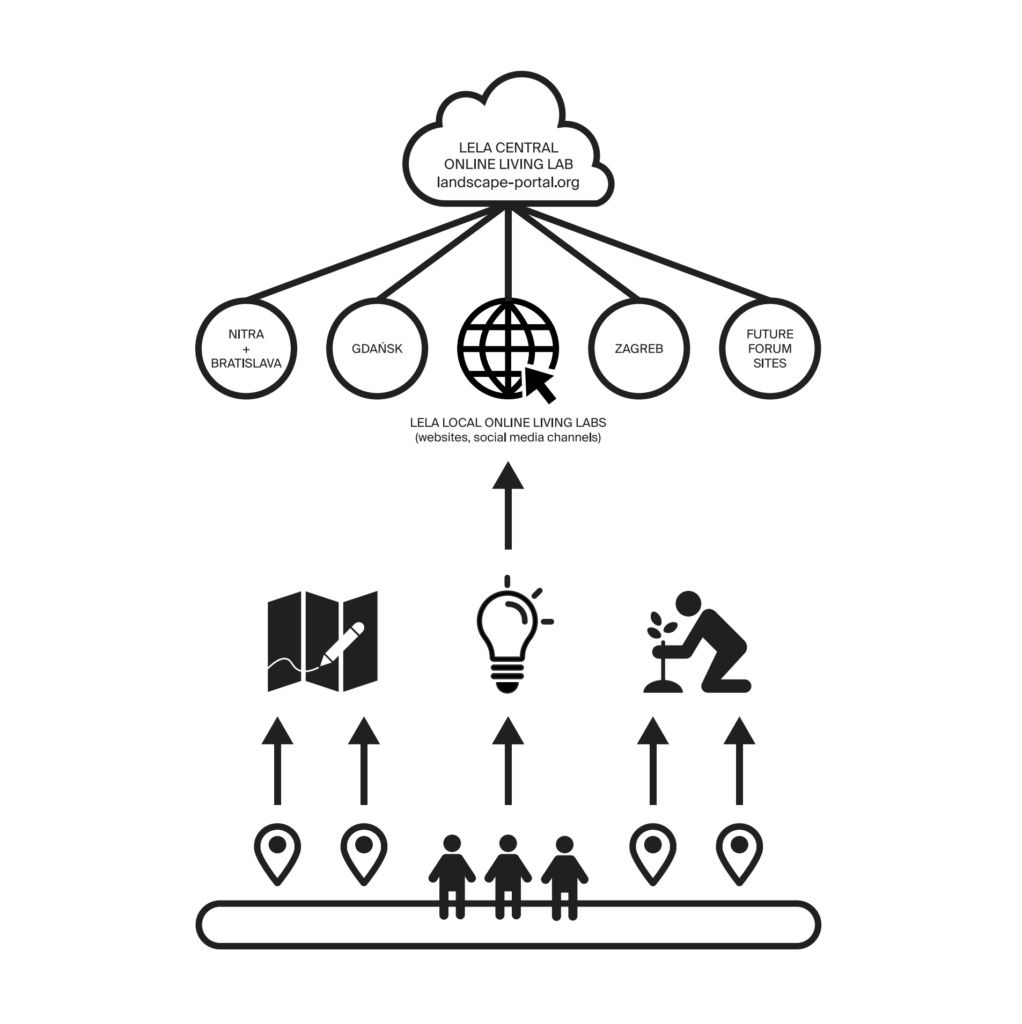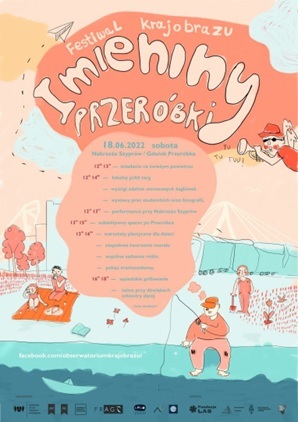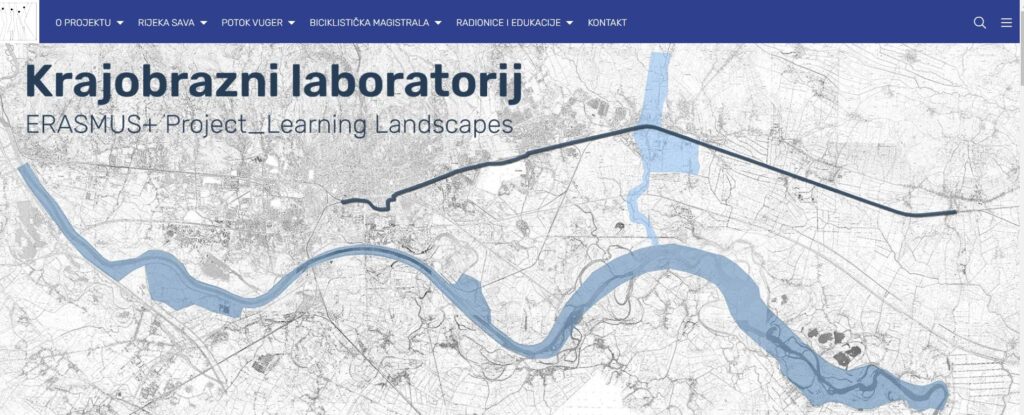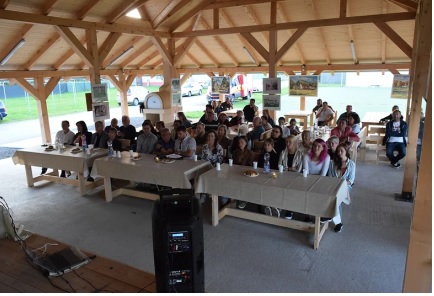Learning Landscapes

About the Learning Landscapes project
collective visioning for shared spaces
Learning Landscapes (LeLa) is a two-year ERASMUS+ Strategic Partnership coordinated by the Slovak University of Agriculture in Nitra, Slovakia with partners in Croatia, Poland, the Netherlands, and Slovakia. The project aims to support capacity building for democratic visioning in the context of spatial design education. The approach builds on an emerging methodology called the ‘Learning Landscapes Process’ and uses participatory digital tools for collective knowledge sharing in the ‘Learning Landscapes Online Labs’. The project started in September 2020 and finished at the end of August 2023.

The project designed a new format for collective visioning based on an innovative partnership of academia, the public sector, and planning professionals with civil society. Underpinning this understanding of the landscape is the European Landscape Convention’s definition of landscape as ‘an area, as perceived by people, whose character is the result of the action and interaction of natural and/or human factors’ (Council of Europe, 2000). We built on the idea that the local landscape is the actual forum for democratic community visioning.
Project objectives
- To open universities to their communities in three regional contexts: Zagreb, Bratislava, and Gdansk
- To prepare university staff members for their role as facilitators who are actively shaping the ‘learning landscapes process’ in an inclusive, empowering, and democratic way.
- To include our students, the future generation of European planners and designers, into this process by adding an inclusive blended learning format to the ‘learning landscapes process’.
- To open up the ‘learning landscapes process’ to civil society by various means such as local design charrettes, open online lecture series, collaborative mapping activities, landscape walks, and storytelling events.
- To create and share knowledge by documenting the learning landscapes methodology as an open educational resource.
LeLa project partners and team
Slovakia
- Slovak University of Agriculture in Nitra (project coordinator)
- Tóth, Attila
- Associate professor of landscape architecture and head of the Institute of Landscape Architecture at the Slovak University of Agriculture in Nitra, authorised landscape architect in the Slovak Chamber of Architects. Studied landscape architecture and planning in Nitra (SUA) and Vienna (BOKU and TU). Teaches thematic open-space design studios and green infrastructure planning. His main research interest is green infrastructure policy, planning, design, and implementation through landscape architecture. In professional practice, he designs mainly public open spaces, parks, and squares. He is chair of the LE:NOTRE Institute Board, member of the ExCo of IFLA Europe, and ECLAS delegate. He is actively involved in the local community in his hometown, where he co-designed and co-founded a local community park and a civic association.
- Čibik, Miroslav
- Researcher and graduated landscape architect, currently working as an Assistant Professor at the Institute of Landscape Architecture (ILA) at Slovak University of Agriculture in Nitra, Slovakia (SUA). Completed Landscape Architecture, Landscape & Spatial Planning. At master’s degree also studied for two semesters in Warsaw, Poland at the Warsaw University Of Life Sciences (WULS). As part of his Ph.D. studies, he did research in Austria at Vienna University of Technology (TU Wien). His research activity is focused on “white spaces“ of the city or so-called “urban gaps“. His interests include designing and building small-scale ephemeral architecture as short-term interventions in the urban landscape.
- Tóth, Attila
- Slovak University of Technology in Bratislava
- Kristianova, Katarina
- An architect and urban planner, currently an Associate Professor at the Institute of Urban Design and Planning in the Faculty of Architecture and Design of the Slovak University of Technology in Bratislava. She holds a doctoral degree in landscaping and leads the Centre of Landscape Architecture at the Faculty of Architecture and Design. In her research and teaching she focuses on the management of urban green spaces, green infrastructure, public urban space, cultural landscape, and history of landscape architecture. She represents the Slovak University of Technology in Bratislava in ECLAS.
- Kristianova, Katarina
- NGO-Partner: Ecopolis
- Matina Paulíková
Croatia
- University of Zagreb, Faculty of Agriculture, Department for Ornamental Plants, Landscape Architecture and Garden Art
- Monika Kamenečki
- Landscape architect and Assistant Professor at the University of Zagreb Faculty of Agriculture, Study of Landscape Architecture, authorised landscape architect in the Croatian Chamber of Architects. Before her employment at the University, she had worked for more than a decade in the private sector. Her work included design, implementation, and construction supervision, and has a license to work on cultural heritage locations. Professional work includes the design of public open space, parks, tourist resorts, golf courses, and recreational areas. Her work is focused on the implementation of NBS solutions in Croatian legislation and policies. She works on modules regarding landscape construction and material science, sustainable technical planning, detailing, and plant use.
- Aneta Mudronja Pletenac
- An architect experienced in different areas of architectural work as well as education and civil actions. She works at the University of Zagreb, Faculty of Agriculture, Study of Landscape Architecture. Before her current employment, she had worked for more than a decade at the Institute of Architectural Heritage, at the Institute of Architecture, University of Zagreb, Faculty of Architecture as a member of different project teams. Her main topic emphasizes the synthesis of artistic, technical, social, and human components in architectural design. Throughout her career, she has been an active member of different professional organizations and NGOs in which she developed numerous projects aiming at the democratisation of the profession and dissemination of disciplinary knowledge (Society of Zagreb Architects, Association of Croatian Architects among others). She is a Ph.D. candidate in the doctoral programme in interdisciplinary humanities at the University of Zadar.
- Petra Pereković
- landscape architect and associate professor at the University of Zagreb, Faculty of Agriculture, in Croatia. Her research and professional interests are focused on the field of landscape and urban open space design, perception of landscape, and green infrastructure related to city development.
- Dora Tomić Reljić
- Graduated landscape architect and assistant professor at the University of Zagreb, Study of Landscape Architecture. She has worked at University since graduation, in 2010, where she received her PhD degree in 2017. She has coordinated and participated in many professional and scientific projects, mainly in the fields of landscape planning, landscape evaluation, green infrastructure, and landscape characterization (on local, regional, and state levels). She teaches modules regarding landscape and conservation planning, landscape protection, landscape analysis, and landscape characterization. As an author and co-author, she has published numerous scientific and professional papers in journals and she has presented her research at conferences.
- Sonja Vuk / University of Zagreb Academy of Fine Arts, Croatia
- An artist and art educator employed as associate professor at the Academy of Fine Arts in Zagreb, Croatia. Acquired a post-graduate master’s degree in video at the Academy of Fine Arts and Design in Ljubljana and a Ph.D. in art education at the Education Faculty in Ljubljana, Slovenia. Deals with video art and interdisciplinary art projects that test out social issues. In art education, her research focuses on the creative process of students, and their personal growth in contemporary society so that students offer solutions to current problems related to sustainable development, civic responsibility, and interpersonal relations through artistic expression.
- Monika Kamenečki
- NGO-Partner: Green Blue Sesvete
- Marijo Spajić
- Landscape architect with a master’s degree from the University of Zagreb has gained extensive experience in project management for various EU programs during his tenure with the NGO ZIPS, as well as his current position at the Energy Institute Hrvoje Požar. He actively participated, as a coordinator and an administrative manager, in projects funded by Interreg, Horizon, Erasmus+, and many other programs. His contributions to the field are underscored by a publication in Acta Horticulturae et Regiotecturae, where he explored the topic of green infrastructure and planning procedures, as well as his engagement in public activities and teaching.
- Marijo Spajić
Poland
- Academy of Fine Arts in Gdańsk
- Dominika Gołębiewska
- landscape architect, spatial planner, and art-oriented interdisciplinary designer. She is a lecturer at the Academy of Fine Arts in Gdańsk. In 2018 she defended her doctoral thesis in the field of protection and shaping of the environment. She is a dedicated social activist, coordinator, and participant in many national and international projects and grants related to the protection of natural and cultural heritage, such as LE:NOTRE Landscape Forum. Through her work, she tries to combine her two passions – art and science. Privately – she lives in her beloved hometown Gdańsk, she has a dog named Kluska and she loves the Red Hot Chili Peppers.
- Marek Barański
- architect and archaeologist dedicated to strengthening local identities and protecting and popularising tangible and intangible cultural heritage initiator and active participant in many revitalisation projects in particular in Gdańsk, Poland. Board member of the non-governmental organisation ‘The Storytellers’ which fights for civil consciousness and sustainable local development by electing, promoting, and reintroducing in a creative way living memes and post histories of people and places of the Lower Town in Gdańsk. Long-term researcher and author of scientific articles on cent architecture at UNESCO sites. One of the expert consultants in building archaeology and conservation architecture in a workshop-based educational project Stewards of Cultural Heritage. Associate Professor at the Academy of Fine Arts in Gdansk at the Faculty of Architecture and Design where he conducts classes on the basics of the theory and methodology of architectural design and runs a studio of revitalisation. Head of the Department of Architecture of Cultural Spaces.
- Dominika Gołębiewska
- Gdansk Urban Development Association (FRAG)
- Piotr Smolnicki
- Architect-urban planner, doctor, assistant professor at the Gdańsk University of Technology, where he teaches urban planning and scientifically deals with city planning at the interface with other fields, in particular transport. Architect in an architectural office, where he deals in particular with the design of public spaces and urban projects. Every day he travels by bike and by train.
- Karol Spieglanin
- Graduate of Management at the Gdańsk University of Technology and the Maritime University of Gdynia. One of the founders and current president of the Gdańsk Urban Development Association.
- Pawel Mrozel
- Architect focused on urban planning. Graduate of Gdańsk University of Technology. Urban activist. Co-founder and vice president of Gdansk Urban Development Association (FRAG). Member of the Urban Planning and Architectural Commission of the City of Gdańsk. Founder of the Facebook profile “Sto Lat Planowania,” which focuses on a satirical critique of pathological phenomena and processes occurring in the spaces of Polish cities and villages, for which he received the Pomeranian Voivodeship Marshal’s Award and Wyborcza’s Press “Urbanist Storm of the Year” award. Editor and columnist on the Architecture and Business portal.
- Oskar Amiri
- a licensed architect, with many years of experience in architectural design and project coordination. He runs his own architectural studio in Warsaw, specialising in public and educational buildings, mostly nurseries, kindergartens, and schools. He obtained a Ph.D. at Gdańsk University of Technology in the discipline of architecture and urban planning. As an urban planner, he designs temporary cities for international events, on a scale of tens of thousands of people. Definitely a keen cyclist, with a great passion for city and urban space.
- Piotr Smolnicki
The Netherlands
- LE:NOTRE Institute
- Jeroen de Vries
- landscape architect active in teaching, research, and professional practice. Dedicated to designing visions and fostering innovation for sustainable development. In projects often acting as the driving force: structuring, organising discussion, guiding decision making, supporting colleagues, editing, and implementing the outcomes. Graduated as a landscape architect at Wageningen University with a specialisation in landscape design and landscape ecology. Is a partner of a consultancy office on public spaces (DG Groep) and director researcher of the LE:NOTRE Institute. He initiated the Erasmusplus project AESOP4Food for sustainable food planning and organised a collaborative process for setting standards in landscape architecture.
- Roxana Triboi
- a Ph.D. architect and urban planner specialised in sustainable food planning, food policy, nature-based solutions, urban agriculture, participatory planning, and transdisciplinary action research and teaching. Currently, besides coordinating the AESOP4food ERASMUS+ program for LE:NOTRE Institute, she is also the food thematic evaluator of the European Urban Agenda for EUI. Her professional experience revolves around the urban-productive-nature paradigm and includes, among others, involvement in diverse European projects on NBS, social inclusion, participatory planning and climate change, consultancy for different Territorial Food Strategies, and managing a community garden. Amongst other things, she held and contributed to a series of conferences and seminars on food planning and urban pastoralism like the international conference “Food Urbanism” in Tartu (2018), Decolonizing food systems and food research (2017, ) and AESOP sustainable food planning conferences (2015, 2022)
- Ellen Fetzer
- holds a diploma and a doctoral degree in landscape planning from Kassel University, Germany. Since 2001 she has been working at the faculty for landscape architecture, and environmental and urban planning in Nürtingen (Stuttgart area). She is primarily coordinating an international master’s degree in landscape architecture (IMLA). The second focus of her work is on computer-supported collaborative learning in the field of transnational education.
- Jeroen de Vries
The LeLa Living Labs
Living labs provide a model that helps academic institutes to connect to a social and cultural context, and understand the everyday challenges of inhabitants and their environment. The Model has a valuable impact on the local community by reconciling individual with group interests and by creating common value through collective conceptualisations.
Academics in the LeLa living labs have the role of knowledge mediators, providing the methodology for the LeLa Lab activity, but they also learn, together with the students, from the inhabitants of the space they are addressing.
The creation of a living lab enables the development of “innovation”, “openness” and “spontaneity” in various processes, which generates “sustainable solutions” and “multiple benefits” as well as producing new “knowledge”.
Also, the process of co-creation and co-production gives the opportunity for university staff to support the end-users throughout the process and to integrate research and innovation in concerned communities and settings. This strengthens the impact of replication and upscaling.
The LeLa Labs function as an iterative cycle of research, action, and reflection that creates new research methods and integrates scientific with societal knowledge.
Gdansk (Gdańsk) LeLa Living Lab

The Landscape Observatory (Obserwatorium krajobrazu), was started and implemented as part of close cooperation between the Academy of Fine Arts in Gdansk, in particular Subfaculty of Architecture of Cultural Spaces (Akademia Sztuk Pięknych w Gdańsku, Kierunek Architektury Przestrzeni Kulturowych), and non-governmental organisation Gdansk Urban Development Association (Forum Rozwoju Aglomeracji Gdańskiej). It focused on the Port Island (Wyspa Portowa) in Gdansk, which is a rapidly transformed and highly diversified area in terms of development, use, as well as its cultural and natural characteristics.
Zagreb LeLa Living Lab

The Krajobrazni laboratorij begins its work in synergy with the local NGO Green and Blue Sesvete, a very active non-governmental organisation of citizens of Zagreb’s fast-growing suburbs. Previous collaborations and projects that our department carried out in collaboration with the NGO Green and Blue Sesvete and their other projects and activities in the community were our guarantors for the establishment of a stable initial small collaborative core for the preparation and organisation of a two-year project (three-year, due to the Covid pandemic). Sesvete is a suburban settlement and part of the city of Zagreb as one of the administrative districts.
Living Lab Nitra

LeLa Living Lab Nitra at the Institute of Landscape Architecture in Nitra, Faculty of Horticulture and Landscape Engineering, Slovak University of Agriculture in Nitra (Slovakia) is a living laboratory of landscape architecture, which during three academic years and five semesters created a platform for several activities related to architecture, landscape architecture, urbanism, urban planning and design across all scales. The laboratory implemented all activities through the educational process at the university within various design studios, seminars, and courses led by lecturers, mentors, and experts from practice.
The Bratislava Living Lab
LeLa Living Lab Bratislava at the Faculty of Architecture, Slovak University of Technology in Bratislava, and its activities are implemented through the education process in urban design studios and seminars (Illes, Kristianova, 2022) The work in urban design studios focuses on the urban development of urban, periurban and rural landscapes, which are diverse in terms of use, cultural and natural characteristics. The main aim of the LeLa Living Lab is to foster a sensitive approach towards landscapes in urban design studios (Illes, Joklova, 2022) and to promote goals of sustainability by applying innovative solutions consulted with experts and by applying landscape democracy principles through the involvement of residents, local activists, stakeholders, non-governmental organizations, and the municipality and public sector representatives.
The Landscape Democracy Seminar
This project builds on a previous process, during which we have tried to define landscape democracy as a conceptual framework for our shared action.
It is important to remember that we understand landscape according to the European Landscape Convention (ELC, Council of Europe, 2000). In that sense, landscape is defined as an area as perceived by people, thus the individual human factor regarding the definition of landscape values is really relevant. Furthermore, the ELC avoids a polarisation of the landscape concept between urban and rural. According to this document, landscape includes urban, peri-urban, and rural areas, both outstanding and degraded ones. The convention is a clear pledge for the everyday environment that starts in front of our doors and calls on everyone to take action and responsibility. The ELC builds on the idea that equal access to a healthy, safe, and meaningful landscape is part of the human rights agenda that the Council of Europe aims to promote and protect.
This leads clearly to the democratic dimension of this approach. Landscape is no longer a sectoral expertise. It is supposed to become both, an integrated political objective and a contemporary cultural project. We believe that new methods are needed for achieving this important objective.
The mission of this project is therefore to promote the development of competences for landscape democracy and understanding landscapes as a platform for learning. But, landscapes are complex and there is no ready-made approach that would work in any context. What we discuss and offer is a set of values that guides us along a process.
The participants of the LeLA Living labs followed for this an online seminar that was developed as a part of the LED2LEAP Erasmus+ project. The content, learning aims, methods, presentations, and recordings can be consulted on this wiki.
The LeLa methods and tools
The target groups of the Learning Landscapes project are university staff and students, local community stakeholders such as cultural representatives, educational institutions, NGOs, policy-makers, administrations, and local community associations. Through the ‘Learning Landscapes Process’ the project will also address members from civil society in general and specific social groups such as school students, the elderly, youth in general, ethnic groups, or refugees. For this, the project developed a handbook on the learning landscapes process and its methodology and on the staff development process: The Learning Landscapes Process (Output 1), which has been published on Research Gate.
Substantial capacity and skills development among the core target groups of the ‘Learning Landscapes’ project, which will be transferable to other European audiences and future forum locations.
The LE:NOTRE landscape forums and student competitions
The Learning Landscapes project is implemented in close coordination with the annual landscape forum of the LE:NOTRE Institute, one of the project partners. Therefore, the host institutions of the 2019 forum in Zagreb and the 2020 cross-border forum in Bratislava are participating, as well as the 2021 forum host, the University of Fine Arts in Gdansk. Each university is collaborating with a local NGO to ensure close relations with communities, citizens, and stakeholders.
The three forum locations provide the basis for a new dialogue and knowledge-sharing process:
- The community of Sesvete is part of the urban agglomeration of Zagreb in Croatia. Sesvete is in the process of community-based green space development. In addition, the wider green and blue infrastructure development of Zagreb, as studied in the international student competition and discussed during the landscape forum in 2019, was revisited and deepened in workshops and student projects.
- The cross-border area east of Bratislava in Slovakia brings the urban periphery of a European capital together with rural areas on the Austrian and Hungarian sides. The Universities of Nitra and Bratislava followed up on the process that started in the fall of 2019 with the international student competition and the digital landscape forum held in April 2020.
- The coastal landscape of Gdansk and its agglomeration was the focus of the 2021 landscape forum. The student competition focused on the Gdansk Port Island as a landscape of transition facing multiple challenges.
The results of the international student competitions related to each forum can be viewed on the LE:NOTRE Forum website.
Workshops and dissemination activities
- International workshops in Gdansk (2021) and Bratislava (2022). These events took the form of design charrettes with strong community involvement.
- Two dissemination events, one linked to the landscape forum in Gdansk in 2021 and one hosted by the University of Zagreb in the summer of 2023.
Resources and reference material
Three web-based interactive platforms documenting the Learning Landscapes process at each location and facilitating its follow-up activities in a cross-sectoral and interdisciplinary partnership: Learning Landscapes Online Labs:
The Zagreb living lab
https://lela-landscapes.agr.hr/
The Gdansk living lab:
facebook page: https://www.facebook.com/obserwatoriumkrajobrazu/
instagram: https://instagram.com/obserwatorium_krajobrazu?igshid=OGQ5ZDc2ODk2ZA==
The Nitra living lab
The Interactive Experimental Garden of the Nitra LeLa Living Lab:
https://www.interaktivnazahrada.sk/
https://www.facebook.com/uka.fzki.spu/posts/764821968768300
https://www.facebook.com/uka.fzki.spu/posts/767096138540883
An online discussion series on building communities and green infrastructure:
No. 6 https://www.facebook.com/uka.fzki.spu/posts/725272679389896
No. 5 https://www.facebook.com/uka.fzki.spu/posts/721069553143542
No. 4 https://www.facebook.com/uka.fzki.spu/posts/716244040292760
No. 3 https://www.facebook.com/uka.fzki.spu/posts/706112411305923
https://www.facebook.com/uka.fzki.spu/posts/748353177081846
Meetings, workshops, and presentations for the public:
https://www.facebook.com/uka.fzki.spu/posts/567474988503000
https://www.facebook.com/uka.fzki.spu/posts/566342761949556
https://www.facebook.com/uka.fzki.spu/posts/846091090641387
https://www.facebook.com/uka.fzki.spu/posts/779408797309617
Poster presentation at the LE:NOTRE landscape forum in Nürtingen:
LeLa Project:
LeLa Living Lab Nitra:
Thematic issue in Acta Horticulturae et Regiotecturae with LeLa contributions:
Project publications from the Nitra LeLa Living Lab – books:
Poľný Kesov village centre: http://www.slpk.sk/eldo/2021/dl/9788055223339/9788055223339.html
Veľký Kýr village centre: http://www.slpk.sk/eldo/2023/dl/9788055226262/9788055226262.html
Ivanka pri Nitre – Park of Chocolate:
http://www.slpk.sk/eldo/2023/dl/9788055226330/9788055226330.html
Published conference papers with LeLa acknowledgement:
WHERE THE SQUARE MEETS THE STREAM: RE-DESIGNING THE RURAL SQUARE IN VEĽKÝ KÝR, SLOVAKIA: https://doi.mendelu.cz/pdfs/doi/9900/04/00.pdf
HANDS ON THE LOCAL GREEN: COMMUNITY-BASED PROJECTS OF GREEN SPACE CODESIGN IN SLOVAKIA: https://doi.mendelu.cz/pdfs/doi/9900/01/3900.pdf
SCENARIOS FOR OPEN SPACE CONVERSION FROM AN EXHIBITION GROUND TO A SUSTAINABLE MULTIFUNCTIONAL URBAN PARK: https://doi.mendelu.cz/pdfs/doi/9900/01/6800.pdf
LANDSCAPE – ARCHITECTURAL PROPOSAL OF JANDURA PARK IN CANBERRA, AUSTRALIA: EXPERIENCE OF BILATERAL COOPERATION BETWEEN TWO UNIVERSITIES: https://doi.mendelu.cz/pdfs/doi/9900/03/5100.pdf
Journal papers with LeLa acknowledgment:
Planning and designing green infrastructure across landscapes and scales: https://sciendo.com/article/10.2478/ahr-2022-0001
Book chapter with LeLa acknowledgment:
In the Footsteps of the Károlyi through their Gardens and Parks in today’s Slovakia: https://www.researchgate.net/publication/358986425_In_the_Footsteps_of_the_Karolyi_through_their_Gardens_and_Parks_in_today’s_Slovakia
YouTube video on the LeLa Summer School in Bratislava:
Social media / https://www.facebook.com/uka.fzki.spu:
LeLa Living Lab Activities:
Design studios in Nitra: https://www.facebook.com/uka.fzki.spu/posts/612634930653672
https://www.facebook.com/uka.fzki.spu/posts/250562573527578
Design workshop in Fulianka 2021 and 2022: https://www.facebook.com/media/set/?vanity=uka.fzki.spu&set=a.343674127549755
https://www.facebook.com/uka.fzki.spu/posts/563257145591451
Hands-on workshops with local communities: https://www.facebook.com/uka.fzki.spu/posts/403291201588047
https://www.facebook.com/uka.fzki.spu/posts/491440906106409
https://www.facebook.com/profile.php?id=100070177753302
https://www.facebook.com/media/set/?vanity=tothferiphoto&set=a.580705820721768
https://www.facebook.com/permalink.php?story_fbid=405710421778213&id=100070177753302
Fieldworks with students and pupils:
https://www.facebook.com/uka.fzki.spu/posts/468057065111460
https://www.facebook.com/media/set/?vanity=uka.fzki.spu&set=a.468042258446274
https://www.facebook.com/uka.fzki.spu/posts/721558866427944
https://www.facebook.com/uka.fzki.spu/posts/713416963908801
https://www.facebook.com/uka.fzki.spu/posts/712857560631408
https://www.facebook.com/media/set/?vanity=alapiskola.tardoskedd&set=a.5335507513198892
Multiplier Event in Zvolen: https://www.facebook.com/zvolen.mesto
Learning, Teaching, Training Event in Bratislava 2022:
https://www.facebook.com/media/set/?vanity=uka.fzki.spu&set=a.542450544338778
https://www.facebook.com/events/713988689661340?active_tab=about
Learning, Teaching, Training Event in Gdansk 2021:
https://www.facebook.com/media/set/?vanity=uka.fzki.spu&set=a.367571115160056
https://www.facebook.com/uka.fzki.spu/posts/559978882595123:559978882595123
https://www.facebook.com/nadacia.ekopolis/posts/10159627310005929
Erasmus+ LeLa: Learning Landscapes Transnational Project Meetings
1st Transnational Project Meeting in Nitra 2022: https://www.facebook.com/uka.fzki.spu/posts/625556682694830
2nd Transnational Project Meeting in Gdansk 2023:
3rd Transnational Project Meeting in Bratislava 2023: https://www.facebook.com/uka.fzki.spu/posts/698720355378462
4th Transnational Project Meeting in Nitra 2023: https://www.facebook.com/uka.fzki.spu/posts/748359660414531
5th Transnational Project Meeting in Zagreb 2023:
https://www.facebook.com/uka.fzki.spu/posts/641976231052875
https://www.facebook.com/uka.fzki.spu/posts/774953081088522
The Bratislava living lab:
https://www.fad.stuba.sk/sk/ustavy/ustav-urbanizmu-a-uzemneho-planovania.html?page_id=1572
https://www.fad.stuba.sk/va-kovac-joklova.html?page_id=7030
Wiki Landscape Democracy Seminar
The wiki of the landscape democracy seminar can be accessed here and its Facebook page here.





